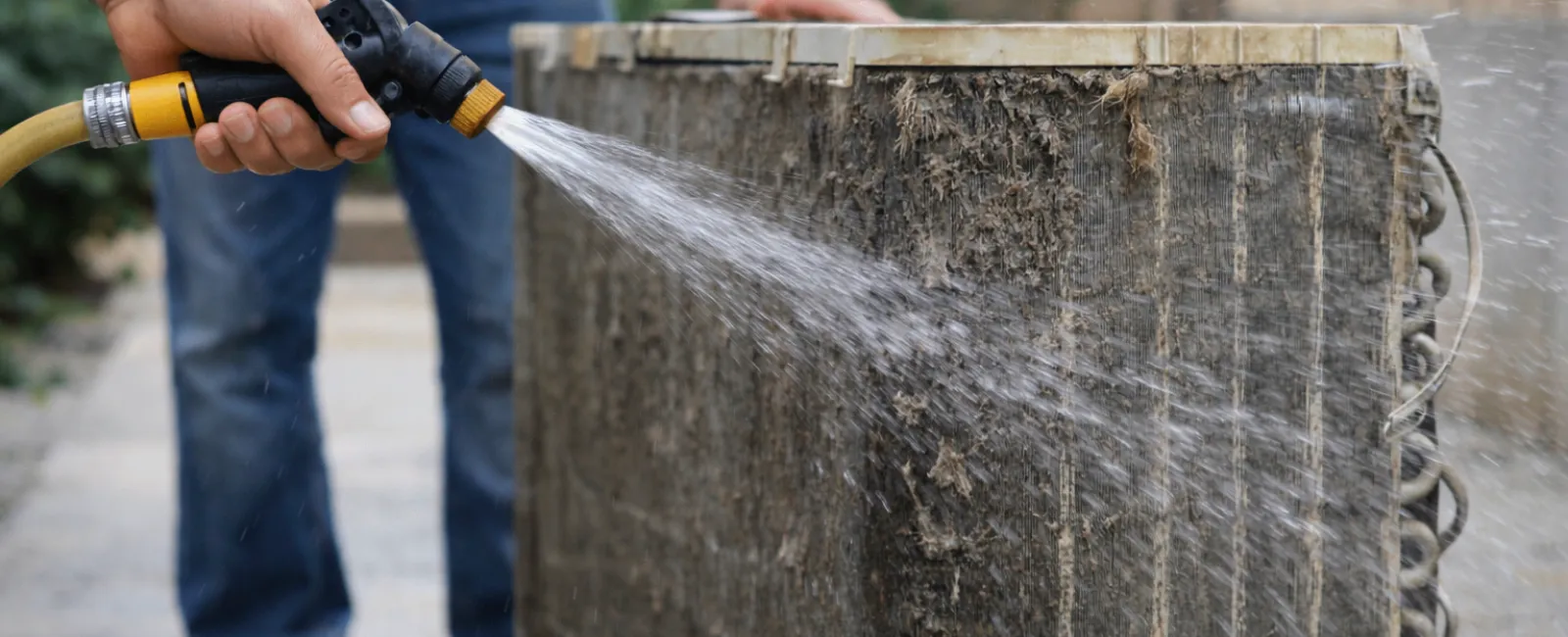January 28, 2025
Yes, you can safely spray water on your AC unit while it's running. In fact, it's one of the best ways to keep your air conditioner running efficiently. Your outdoor AC unit is designed to withstand rain, so a gentle spray from a garden hose won't cause any damage.
Many homeowners worry that mixing water and electrical appliances is dangerous. But your outdoor condenser unit is built for outdoor conditions. Spraying it with water while it's running is not only safe, it actually helps the system cool more effectively by washing away dirt and debris that block airflow.
In this guide, we'll cover exactly how to clean your outside AC unit with a water hose, the best techniques to use, and why regular cleaning is essential for hot summers.
Why Spraying Water on Your AC Unit Helps Performance
Your air conditioner works by transferring heat from inside your home to the outside. The outdoor unit (called the condenser) releases that heat into the air through a set of metal fins and coils. When dirt, grass clippings, pollen, and debris clog these fins, your system can't release heat efficiently.
Here's what happens when your AC unit gets dirty:
- Reduced cooling power. A dirty condenser acts like insulation, trapping heat instead of releasing it. Your AC has to work harder to cool your home, and you may notice warm air coming from vents.
- Higher energy bills. When your system runs longer cycles to compensate for poor heat transfer, it uses more electricity. A clean AC unit can reduce energy consumption significantly.
- Premature wear on components. Overworking your AC stresses the compressor, fan motor, and other parts. This leads to more frequent repairs and a shorter lifespan for your system.
- Risk of overheating. In extreme cases, a severely clogged condenser can cause the system to overheat and shut down, leaving you without cooling on the hottest days.
By spraying water on your AC unit, you wash away the buildup and restore proper airflow. The water also helps cool the condenser coils directly through evaporation, giving your system an extra efficiency boost.
How to Clean Your Outside AC Unit with a Water Hose
Cleaning your AC unit with a garden hose is straightforward. Here's the safest and most effective method:
Step 1: Clear the area around your unit. Remove any leaves, sticks, grass clippings, or debris from around the condenser. Keep at least two feet of clearance on all sides for proper airflow.
Step 2: Use a standard garden hose. You don't need a pressure washer. In fact, high pressure can bend the delicate aluminum fins, causing damage. A regular hose with a spray nozzle works best.
Step 3: Spray from top to bottom. Start at the top of the unit and work your way down. This pushes dirt downward and off the fins rather than deeper into the coils.
Step 4: Use moderate water pressure. A steady stream is fine for rinsing away loose debris. For stubborn dirt, you can increase the pressure slightly, but avoid blasting the fins directly.
Step 5: Avoid the electrical panel. While the unit is water-resistant, it's best to avoid spraying directly at the control panel or electrical disconnect box. Focus on the coils and fins.
Step 6: Let it dry before heavy use. If you turned off the unit before cleaning, wait about 30 minutes before turning it back on. If you cleaned it while running, the system will continue operating normally.
Can You Hose Down Your AC Unit While It's Running?
Yes, you can hose down your AC unit while it's running. The outdoor condenser is built to handle rain and moisture. Spraying it with water while it operates is completely safe when you follow a few guidelines:
- Use gentle to moderate water pressure (no pressure washers)
- Avoid directing water at the electrical disconnect box
- Don't spray upward into the fan motor
- Keep a safe distance and let the water do the work
Some homeowners prefer to turn off the unit at the thermostat before cleaning. This is a matter of personal comfort. Either approach is safe, but cleaning while running can actually be beneficial because the fan helps blow loose debris away from the coils.
How Often Should You Spray Your AC Unit?
For most homes in the Canton, Woodstock, and Roswell areas, we recommend cleaning your outdoor AC unit at least twice per year:
- In spring, before the cooling season begins, clear pollen, leaves, and debris that accumulated over winter.
- In mid-summer, when pollen counts are high, your system is working its hardest.
If your unit is near trees, landscaping, or dusty areas, you may need to clean it monthly during peak cooling season. Cottonwood trees are especially problematic because the fluffy seeds can completely coat condenser coils in just a few days.
Deep Cleaning Tips for Stubborn Dirt
If rinsing with water alone doesn't remove all the buildup, you can use a foaming coil cleaner designed for AC condensers. Here's how:
- Turn off the AC at the thermostat
- Spray the coil cleaner according to the product directions
- Let it foam and sit for 5-10 minutes
- Rinse thoroughly with your garden hose
- Allow the unit to dry before restarting
Pro tip: If you notice bent fins on your condenser, you can straighten them with a fin comb (available at most hardware stores). Bent fins restrict airflow and reduce efficiency.
When to Call a Professional
While hosing down your AC unit is a simple DIY task, some situations call for professional help:
- Your AC still isn't cooling well after cleaning. This could indicate low refrigerant, a failing compressor, or other issues that require a technician.
- You hear unusual noises. Grinding, squealing, or rattling sounds suggest mechanical problems that won't be solved by cleaning.
- The unit is severely clogged. If debris has been building up for years, professional coil cleaning may be needed to fully restore performance.
- It's time for annual maintenance. A professional AC tune-up includes cleaning both the outdoor and indoor coils, checking refrigerant levels, testing electrical components, and ensuring your system runs at peak efficiency.
Frequently Asked Questions
Can I spray my AC unit with water while it's running?
Yes, you can safely spray your AC unit while it's running. The outdoor condenser is designed to withstand rain and moisture. Just use gentle water pressure and avoid spraying directly at the electrical panel.
Will spraying water on my AC damage it?
No, spraying water on your AC unit won't damage it when done correctly. Avoid using a pressure washer, which can bend the delicate fins. A standard garden hose is the safest option.
How often should I hose down my AC unit?
Clean your outdoor AC unit at least twice a year: once in spring, before the cooling season, and once in mid-summer. If you have trees or landscaping nearby, monthly summer cleaning helps maintain peak performance.
Should I turn off my AC before spraying it?
It's not required, but some people prefer to turn off the unit at the thermostat before cleaning. Both approaches are safe. Cleaning while running can actually help, as the fan blows away loose debris.
Keep Your AC Running at Peak Performance
Spraying water on your AC unit while it's running is safe, effective, and one of the easiest ways to maintain your cooling system. Regular cleaning removes the dirt and debris that force your system to work harder, helping you stay comfortable while lowering energy costs.
For comprehensive AC maintenance, including professional coil cleaning and system inspection, schedule a tune-up with MR. HVAC. We serve Canton, Woodstock, Roswell, Alpharetta, and surrounding North Georgia communities.
Having cooling problems that cleaning doesn't fix? Our team provides fast, reliable AC repair when you need it most.




